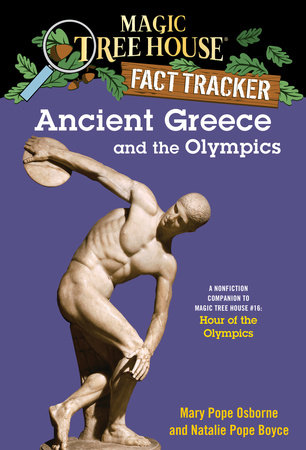TEACHING GUIDE
NOTE TO TEACHERSMagic Tree House Research Guide: Ancient Greece and the Olympics
ABOUT THIS BOOKWhat was it like to live in ancient Greece? What gods and goddesses did Greeks believe in? How did the Olympics start? What was the winner’s prize? Find out the answers to these questions and many more in this Magic Tree House Research Guide. Includes fun facts from Jack and Annie, fantastic photos and illustrations, and a guide to doing further research!
TEACHING IDEASGetting Started
Ask students what their favorite games are on the playground, in the gym, and at home. Do they like to play games alone? With another person? With groups or teams? Discuss the meaning of “competition.” What kinds of competition do they participate in at home, in school, or in their community? How do they feel when they win? When they lose?
Using a show of hands, ask how many students have heard of or watched the Olympics, an international competition involving many different sports. Show students pictures of different summer and winter Olympic sports. Which events are their favorites? Who are some of their favorite Olympic athletes?
Using a map or a globe, locate Greece and explain that our modern Olympics started with the ancient Greeks almost 3000 years ago as a festival to honor the Greek god, Zeus. Create a timeline showing the geographic location of the winter and summer Olympic Games for the last five years. Note where and when the next games will be held. Explain that students are about to learn a great deal more about these games and the culture of the people who started them in this guide.
Math, Language Arts
It’s Greek to Me!
The names of many of our geometric shapes have Greek origins. Polygons (poly = many; gonia = angles) are closed figures that have several lines and angles. The first part, or
prefix, in the names of these shapes tells how many sides and angles that shape has. For example:
Triangle = 3
Quadrilateral = 4
Pentagon = 5
Hexagon = 6
Heptagon= 7
Octagon = 8
Draw each of these geometric shapes on the blackboard or on individual handouts. Ask students to count the sides and angles in each and see if they can label each polygon correctly.
History, Geography, Math
A Tale of Two Cities
Locate the city-states of Athens and Sparta on a map of Greece, identifying different physical features of their locations. List aspects of language, culture and customs common to both.
Point out that the form of government we have in our United States–
democracy– originated in Athens. Write a definition of
democracy on the blackboard. Compare the ancient Athenian democracy with our modern democracy in America. Discuss whether it is possible for a society to be
democratic when all citizens do not enjoy equal rights.
Point out that
totalitarianism, a form of government practiced by some countries in our modern world (e.g.North Korea), originated in Sparta. Write a definition of
totalitarianism on the blackboard. Using a Venn diagram, illustrate the similarities and differences between life in Athens and life in Sparta. Under which form of government would students prefer to live? Why?
Language Arts, History, Art
MYTHing in Action
The stories of
King Midas or
Jason and the Golden Fleece are as popular today as they were thousands of years ago. Divide your students into small groups, assigning a popular myth from Greek folklore to each. Prepare a question sheet highlighting main ideas and significant plot events to guide reading and discussion. Encourage students to offer their opinions about what happens and why in their story.
Have each group prepare a script for a “Readers’ Theater” performance of their myth for the class. Note that even though all actors in the Greek theater were men, both boys and girls in their groups will be assigned a role in the cast or chorus for their play. Props, masks, and costumes, based on their specific story, may add to the festivities. Arrange classroom seats in a large circle or semi-circle with a center stage area to create the feeling of an open air Greek theater.
Research, Language Arts, Social Studies
The Nature of Heroism
Tales from the ancient Greeks generally connect heroism with physical strength and courage in confronting great dangers. Modern society, however, has recognized new kinds of heroes and different types of heroism. Civil Rights leader, Martin Luther King, actor Christopher Reeve, and astronaut Neil Armstrong have all been called heroes. What qualities do they possess? Who else in our modern world might be viewed as a hero in light of their spirit and contributions to contemporary life? Have students choose and research a person they believe to be a hero of our times and write a profile explaining what this person has done to deserve this status in his/her eyes.
Physical Education, Art
Let the Games Begin!
Allow students to experience the satisfaction of competition and good sportsmanship in their own Class Olympics. Create a flag displaying a symbol for your Olympic competition. Select events to be included. Make it fun! You might have three-legged races, sack races, Frisbee throws, egg-relays, or even a game of Greek hoops, just to name a few. Have students design medals with poster board and paint them gold, silver, and bronze to recognize winners in each event. Choose up teams, review game rules for each event, and let the games begin!
COPYRIGHTPrepared by Rosemary B. Stimola, Ph.D. She is a teacher of Children’s Literature at Hostos Community College/City University of New York and serves as educational and editorial consultant to publishers of children’s books.

